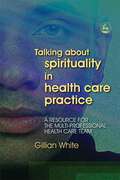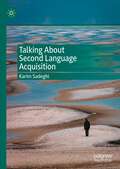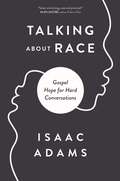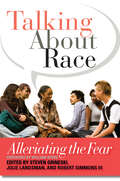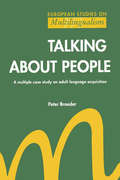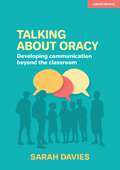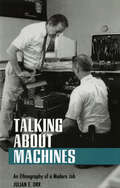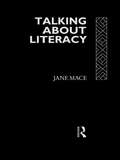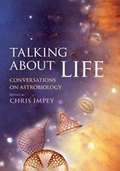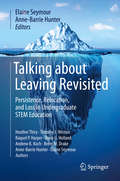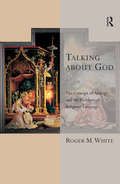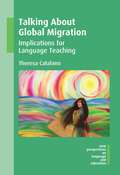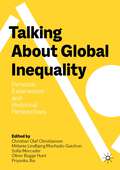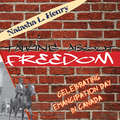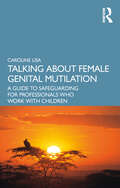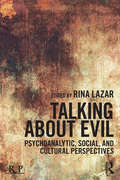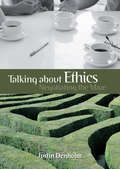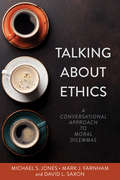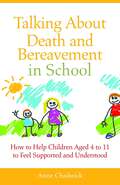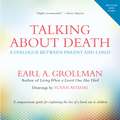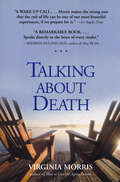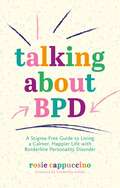- Table View
- List View
Talking About Structural Inequalities in Everyday Life: New Politics of Race in Groups, Organizations, and Social Systems
by Ellen L. Short Leo WiltonThe book, Talking About Structural Inequalities in Everyday Life: New Politics of Race in Groups, Organizations, and Social Systems, provides critical attention to contemporary, innovative, and cutting-edge issues in group, organizational, and social systems that address the complexities of racialized structural inequalities in everyday life. This book provides a comprehensive focus on systemic, societal, and organizational functioning in a variety of contexts in advancing the interdisciplinary fields of human development, psychology, counseling, social work, education, public health, multiculturalism/cultural studies, and organizational consultation. One of the most fundamental aspects of this book engages readers in the connection between theory and praxis that incorporates a critical analytic approach to learning and the practicality of knowledge. A critical emphasis examines how inequalities and power relations manifest in groups, organizations, communities, and social systems within societal contexts.
Talking About Spirituality in Health Care Practice: A Resource for the Multi-Professional Health Care Team
by Gillian WhiteHealth care professionals who endeavour to work holistically face a number of questions about spirituality. What is meant by `spirituality' as opposed to `religion'? What is its specific relevance to health care practice? This accessible book provides answers to these questions and offers a model for personal and professional development. Gillian White sets out a framework within which health care professionals can discuss spirituality and equip themselves to respond appropriately to the spiritual concerns of their patient in daily practice. She draws on her experience of sharing and discussing spirituality and spiritual care with other health care professionals and proposes that multi-professional health care teams should talk about spirituality in challenging but safe environments to develop shared understanding of it, and to increase their confidence about integrating spiritual care into their daily practise. This text is a useful contribution to the multi-disciplinary, whole-person approach in health care and will be of interest to all health care professionals, nursing staff and students in these fields.
Talking About Second Language Acquisition
by Karim SadeghiThis book includes interviews with fourteen internationally-acclaimed leading figures in Second Language Acquisition (SLA), who speak on seminal issues in the field as well as their own contributions to SLA scholarship. As well as covering the contributors’ backgrounds and academic achievements, the interviews also delve into their areas of expertise, current theoretical and practical considerations, and contemporary questions, developments and challenges in SLA. The author probes their views on current topics including input and interaction, vocabulary acquisition, teaching pronunciation, writing development, syntactic processing, multilingualism, L1 attrition, complex dynamic systems, processing instruction, instructed second language acquisition, and technology in language teaching. An introduction by the author draws out the key themes and debates in the field today, and highlights areas for future research and further exploration, and a foreword is provided by Rod Ellis. This book will be of interest to students and scholars of Applied Linguistics, Teacher Education and Methodology, and Second and Foreign Language Education.
Talking About Right and Wrong
by Cecilia Wainryb Holly E. RecchiaThough it is generally acknowledged that parents are directly implicated in how and what their children learn about right and wrong, little is known about how the process of moral socialization proceeds in the context of family life, and how it gets played out in actual parent-child conversations. This volume brings together psychological research conducted in different countries documenting how parents and their children of different ages talk about everyday issues that bear on right and wrong. More than 150 excerpts from real parent-child conversations about children's own good and bad behaviors and about broader ethical concerns that interest both parents and children, such as global warming or gender equality, provide a unique window into the moral-socialization process in action. Talking about Right and Wrong also underscores distinct psychological and sociocultural processes that explain how such everyday conversations may further, or hinder, children's moral development.
Talking about Race: Gospel Hope for Hard Conversations
by Isaac AdamsConversations about racism are as important as they are hard for American Christians.Yet the conversation often gets so ugly, even among the faithful who claim unity in Jesus. Why is that the case? Why does it matter? Can things get better, or are we permanently divided?In this honest and hopeful book, pastor Isaac Adams doesn't just show you how to have the race conversation, he begins it for you. By offering a fictional, racially charged tragedy in order to understand varying perspectives and responses, he examines what is at stake if we ignore this conversation, and why there's just as much at stake in how we have that discussion, especially across color lines--that is, with people of another ethnicity. This unique approach offers insight into how to listen to one another well and seek unity in Christ. Looking to God's Word, Christians can find wisdom to speak gracefully and truthfully about racism for the glory of God, the good of their neighbors, and the building up of the church.Some feel that the time for talking is over, and that we've heard all this before. But given how polarized American society is becoming--its churches not exempt--fresh attention on the dysfunctional communication between ethnicities is more than warranted. Adams offers an invitation to faithfully combat the racism so many of us say we hate and maintain the unity so many of us say we want. Together we can learn to speak in such a way that we show a divided world a different world.Talking About Race points to the starting line, not the finish line, when it comes to following Jesus amid race relations. It&’s high time to begin running.
Talking About Race: Alleviating the Fear
by Steven Grineski Julie Landsman Robert SimmonsWhat is it that gives many of us White people a visceral fear about discussing race?Do you realize that being able to not think about or talk about it is a uniquely White experience?Do you warn your children about how people might react to them; find store staff following or watching you; get stopped by the police for no reason?The students of color in your classroom experience discrimination every day, in small and large ways. They don’t often see themselves represented in their textbooks, and encounter hostility in school, and outside. For them race is a constant reality, and an issue they need, and want, to discuss. Failure to do so can inhibit their academic performance.Failure to discuss race prevents White students from getting a real, critical and deep understanding of our society and their place in it. It is essential for the well-being of all students that they learn to have constructive conversations about the history of race in this country, the impact of racism on different ethnic communities, and how those communities and cultures contribute to society. The need to model for our students how to talk openly and comfortably about race is critical in America today, but it is still an issue that is difficult to tackle.To overcome the common fear of discussing race, of saying “something wrong”, this book brings together over thirty contributions by teachers and students of different ethnicities and races who offer their experiences, ideas, and advice. With passion and sensitivity they: cover such topics as the development of racial consciousness and identity in children; admit their failures and continuing struggles; write about creating safe spaces and the climate that promotes thoughtful discussion; model self-reflection; demonstrate the importance of giving voice to students; recount how they responded to racial incidents and used current affairs to discuss oppression; describe courses and strategies they have developed; explain the “n” word; present exercises; and pose questions. For any teacher grappling with addressing race in the classroom, and for pre-service teachers confronting their anxieties about race, this book offers a rich resource of insights, approaches and guidance that will allay fears, and provide the reflective practitioner with the confidence to initiate and respond to discussion of race, from the pre-school and elementary classroom through high school.
Talking About People; A Multip: A multiple case study on adult language acquisition
by Peter BroederFirst Published in 1991. Routledge is an imprint of Taylor & Francis, an informa company.
Talking about Oracy: Developing communication beyond the classroom
by Sarah DaviesWhether considering the art of debate; understanding dialogic teaching methods; the necessity of questioning; or the ability to assess and develop these skills, this book has been written by a classroom teacher, for classroom teachers, in the hope that oracy is dragged out of the shadows and recognised for its significance to improving students’ life skills and future aspirations. When we think about the transferable skills all students will take with them post-academia, oracy, literacy and numeracy should logistically stand proudly side by side. This triad of skillsets are the key components that are used to measure intellectual development in childhood, as well as being further instilled and nurtured in all students throughout their education. However, as children become students and as these students become critical thinkers, an element of this crucial triad appears to have been disowned in recent years. In 2020, oracy appeared to have even less relevance in academia, with the only supportive provision for both Language and Literature to deal with any missed learning being the eradication of any recorded proof of this skill. Yet another indication that oracy has, in some circumstances, been cast into the shadows and banished into the realm of the subject specific curricular. We need to be realistic and embrace the idea that this skill is a necessity to success for all learners post-academia. Training students in the ability to communicate effectively with different audiences in different contexts, needs to be brought back into the spotlight in the hopes that we can attempt to resolve any misconceptions regarding oracy’s place in the curriculum. Through the recognition of the theoretical understanding of communication that will provide the foundations for this book, the aim is that it acts as a supportive guide that will provide suggestions and strategies in order to hopefully empower and encourage educators in all subjects in education, thus restoring the use and appreciation for this necessary skill both inside and outside the classroom. For so long, focus has been on the stress and rigor of assessments, and the fulfilment of the curriculum to ensure that all students can navigate their GCSE examinations. This book will question whether this will have a detrimental effect on students who may have been exposed to fewer of the skills that they will require when leaving an educational setting and venturing into everyday life. So, let’s address the elephant in the room, and provide it a voice.
Talking about Oracy: Developing communication beyond the classroom
by Sarah DaviesWhether considering the art of debate; understanding dialogic teaching methods; the necessity of questioning; or the ability to assess and develop these skills, this book has been written by a classroom teacher, for classroom teachers, in the hope that oracy is dragged out of the shadows and recognised for its significance to improving students’ life skills and future aspirations. When we think about the transferable skills all students will take with them post-academia, oracy, literacy and numeracy should logistically stand proudly side by side. This triad of skillsets are the key components that are used to measure intellectual development in childhood, as well as being further instilled and nurtured in all students throughout their education. However, as children become students and as these students become critical thinkers, an element of this crucial triad appears to have been disowned in recent years. In 2020, oracy appeared to have even less relevance in academia, with the only supportive provision for both Language and Literature to deal with any missed learning being the eradication of any recorded proof of this skill. Yet another indication that oracy has, in some circumstances, been cast into the shadows and banished into the realm of the subject specific curricular. We need to be realistic and embrace the idea that this skill is a necessity to success for all learners post-academia. Training students in the ability to communicate effectively with different audiences in different contexts, needs to be brought back into the spotlight in the hopes that we can attempt to resolve any misconceptions regarding oracy’s place in the curriculum. Through the recognition of the theoretical understanding of communication that will provide the foundations for this book, the aim is that it acts as a supportive guide that will provide suggestions and strategies in order to hopefully empower and encourage educators in all subjects in education, thus restoring the use and appreciation for this necessary skill both inside and outside the classroom. For so long, focus has been on the stress and rigor of assessments, and the fulfilment of the curriculum to ensure that all students can navigate their GCSE examinations. This book will question whether this will have a detrimental effect on students who may have been exposed to fewer of the skills that they will require when leaving an educational setting and venturing into everyday life. So, let’s address the elephant in the room, and provide it a voice.
Talking about Machines: An Ethnography of a Modern Job
by Julian E. OrrThis is a story of how work gets done. It is also a study of how field service technicians talk about their work and how that talk is instrumental in their success. In his innovative ethnography, Julian E. Orr studies the people who repair photocopiers and shares vignettes from their daily lives. He characterizes their work as a continuous highly skilled improvisation within a triangular relationship of technician, customer, and machine. The work technicians do encompasses elements not contained in the official definition of the job yet vital to its success. Orr's analysis of the way repair people talk about their work reveals that talk is, in fact, a crucial dimension of their practice. Diagnosis happens through a narrative process, the creation of a coherent description of the troubled machine. The descriptions become the basis for technicians' discourse about their experience, and the circulation of stories among the technicians is the principal means by which they stay informed of the developing subtleties of machine behavior. Orr demonstrates that technical knowledge is a socially distributed resource stored and diffused primarily through an oral culture. Based on participant observation with copier repair technicians in the field and strengthened by Orr's own years as a technician, this book explodes numerous myths about technicians and suggests how technical work differs from other kinds of employment.
Talking About Literacy: Principles and Practice of Adult Literacy Education
by Jane MaceTalking about Literacy re-examines dominant notions of what litreracy is, and challenges the problem-solution reflex to the issue (the problem is illiteracy: the solution is more literacy). Literacy has enormous emotional and political associations, and the job of literacy educator often concerns changing attitudes and challenging prejudices - whether in the form of publicity strategies, counselling new students, or in curriculum design. In short, adult literacy education means not only teaching courses like 'fresh start', 'basic skills', 'study skills', 'communication skills', 'language support' and 'return to study', but also designing strategies to encourage people to see that these courses may meet their own interests - and educating them and others to rethink their own negative attitudes to 'illiteracy'. The book looks in detail in at five principles put forward by Jane Mace as central to the education of people who often can read, but wish they could read better; who, technically can write, but have a desire to do so with more expression and coherence. These principles focus on five themes: context, inquiy, authorship, equality and community. Since it is all too easy for literacy education involving adults who do not have formal qualifications to stop short of teaching techniques for 'correct' writing, these principles mean taking seriously a view that adult students are writers as well as readers - that they have an entitlement to be read, as well as to read others.
Talking about Life: Conversations on Astrobiology
by Chris ImpeyWith over 500 planets now known to exist beyond the Solar System, spacecraft heading for Mars, and the ongoing search for extraterrestrial intelligence, this timely book explores current ideas about the search for life in the Universe. It contains candid interviews with dozens of astronomers, geologists, biologists, and writers about the origin and range of terrestrial life and likely sites for life beyond Earth. The interviewees discuss what we've learnt from the missions to Mars and Titan, talk about the search for Earth clones, describe the surprising diversity of life on Earth, speculate about post-biological evolution, and explore what contact with intelligent aliens will mean to us. Covering topics from astronomy and planetary science to geology and biology, this book will fascinate anyone who has ever wondered 'Are we alone?'
Talking about Leaving Revisited: Persistence, Relocation, and Loss in Undergraduate STEM Education
by Heather Thiry Timothy J. Weston Raquel P. Harper Dana G. Holland Andrew K. Koch Brent M. DrakeTalking about Leaving Revisited discusses findings from a five-year study that explores the extent, nature, and contributory causes of field-switching both from and among “STEM” majors, and what enables persistence to graduation. The book reflects on what has and has not changed since publication of Talking about Leaving: Why Undergraduates Leave the Sciences (Elaine Seymour & Nancy M. Hewitt, Westview Press, 1997). With the editors’ guidance, the authors of each chapter collaborate to address key questions, drawing on findings from each related study source: national and institutional data, interviews with faculty and students, structured observations and student assessments of teaching methods in STEM gateway courses. Pitched to a wide audience, engaging in style, and richly illustrated in the interviewees’ own words, this book affords the most comprehensive explanatory account to date of persistence, relocation and loss in undergraduate sciences.Comprehensively addresses the causes of loss from undergraduate STEM majors—an issue of ongoing national concern.Presents critical research relevant for nationwide STEM education reform efforts.Explores the reasons why talented undergraduates abandon STEM majors.Dispels popular causal myths about why students choose to leave STEM majors.This volume is based upon work supported by the Alfred P. Sloan Foundation Award No. 2012-6-05 and the National Science Foundation Award No. DUE 1224637.
Talking about God: The Concept of Analogy and the Problem of Religious Language (Transcending Boundaries in Philosophy and Theology)
by Roger M. WhiteA fundamental question for theology is the question how we are to understand the claims that we make about God. The only language we can understand is the language we use to talk about human beings and their environment. How can we use that language to talk about God while respecting the infinite difference between God and humanity? The traditional answer has been to appeal to the concept of analogy. However, that appeal has been interpreted in widely different ways. This book aims to clarify the question and this answer by an analysis of the concept. It begins with an exploration of the way the concept was evolved by Aristotle out of Greek mathematics as a technique for comparing "things that were remote"; followed by a critical examination of three very different classical accounts of the way religious language works: those of Thomas Aquinas, Immanuel Kant and Karl Barth. The book finally investigates the way in which analogy could be applied to answer the question initially posed - how is it possible to use human language to talk about God. This is a question of fundamental significance for the whole of religion and theology, concerning as it does our whole understanding of what we mean when we talk about God.
Talking About Global Migration: Implications for Language Teaching
by Theresa CatalanoHow do migrants describe themselves and their experiences? As the world faces a migration crisis, there is an enhanced need for educational responses to the linguistic and cultural diversity of student bodies, and for consideration of migrant students at all levels of the curriculum. This book explores the stories of over 70 migrants from 41 countries around the world and examines the language they use when talking about their move to a new country and their experiences there. The book interprets common themes from the stories using metaphor and metonymy analysis to lead to more nuanced understandings of migration that have implications for language teachers. The stories also dispel many stereotypes relating to migration, serving as a reminder to us all to consider our own language when talking about this complex subject.
Talking About Global Inequality: Personal Experiences and Historical Perspectives
by Christian Olaf Christiansen Sofía Mercader Mélanie Lindbjerg Machado-Guichon Oliver Bugge Hunt Priyanka JhaComprising a collection of interview essays with nineteen public intellectuals and scholars from around the world, this book reflects on some of the most pressing questions of our age: what is global inequality; what causes it; and how should we deal with it? Leading figures within the fields of History, Sociology, Economics, Anthropology and Postcolonial Studies, shed light on how their personal backgrounds, places of work, and hometowns have shaped their views on global inequality. We learn about the causes of global inequality, the historical factors that have shaped the world into an unequal place, and the challenges that humanity is confronted with in the face of the widening gap between the poor and the rich. Bringing together voices from the Global North and South, this book helps us to think more broadly about inequality and deepens our understanding of how this long-lasting phenomenon is, and has been, experienced across the globe.
Talking About Freedom: Celebrating Emancipation Day in Canada
by Natasha L. HenryDiscover the main features of Emancipation Day celebrations, learn about the people of African ancestry’s struggle for freedom, and the victories achieved in the push for equality into the 21st century. On August 1, 1834, 800,000 enslaved Africans in the British colonies, including Canada, were declared free. The story of Emancipation Day, a little-known part of Canadian history, has never been accessible to the teen reader through either the school curriculum or classroom resources, despite its significance in the story of Canada. Talking About Freedom closes this gap by exploring both the background to August 1 commemorations across Canada and the importance of these long-established annual celebrations.What is the connection between the Caribana festivities in Toronto and emancipation? Why are some communities restoring Emancipation Day to their roster of annual events? Talking About Freedom introduces a range of personalities and happenings through historical facts, memorable personal recollections, vivid images, and detailed narratives. Included are connections to the ongoing struggles of people of African ancestry as they seek to achieve equality, with insightful links woven across the past, present, and future.
Talking About Female Genital Mutilation: A Guide to Safeguarding for Professionals who Work with Children
by Caroline LisaThis workbook is designed to be used to facilitate discussion and disseminate awareness amongst all professionals (social workers, teachers and health care professionals) who are required by law to report instances of Female Genital Mutilation (FGM). Suitable for use in group settings, it requires no prior knowledge of the subject, but is written in such a way for anyone to be able to facilitate a session with colleagues, which takes between one to three hours depending on the facilitator and group’s needs. Divided into five chapters, it shows how to facilitate a training session using the material, including being aware of how people may be triggered by this difficult subject. Providing activities to facilitate discussion, it explains terminology and provides explanation of different types of FGM, risk factors and legal aspects including mandatory reporting in certain regions. Designed to be concise, it will give busy professionals a quick and effective tool to disseminate information to as many colleagues as possible to allow them to develop understanding of a legal requirement of their job which has real and life-saving benefits for children.
Talking about Evil: Psychoanalytic, Social, and Cultural Perspectives (Relational Perspectives Book Series)
by Rina LazarHow can we talk about evil? How can we make sense of its presence all around us? How can we come to terms with the sad fact that our involvement in doing or enabling evil is an interminable aspect of our lives in the world? This book is an attempt to engage these questions in a new way. Written from within the complicated reality of Israel, the contributors to this book forge a collective effort to think about evil from multiple perspectives. A necessary effort, since psychoanalysis has been slow to account for the existence of evil, while philosophy and the social sciences have tended to neglect its psychological aspects. The essays collected here join to form a wide canvas on which a portrait of evil gradually emerges, from the Bible, through the enlightenment to the Holocaust; from Kant, through Freud, Klein, Bromberg and Stein to Arendt, Agamben and Bauman; using literature, history, cinema, social theory and psychoanalysis. Talking about Evil opens up a much needed space for thinking, in itself an antidote to evil. It will be of interest to psychoanalysts, psychotherapists, and scholars and students of philosophy, social theory and the humanities.
Talking about Ethics: Negotiating the Maze
by Justin DenholmTalking about Ethics is a fantastic resource for Christians keen to engage with the world around them on ethical issues. From understanding the impact of differing worldview and framework on ethical reasoning through to helpful pastoral insights into discussing ethics in an everyday or church context, the author demonstrates the value of ethics for every Christian.
Talking About Ethics: A Conversational Approach to Moral Dilemmas
by Michael S. Jones Mark J. Farnham David L. SaxonAn accessible introduction to ethics through engaging dialoguesTalking About Ethics provides the reader with all of the tools necessary to develop a coherent approach to ethical decision making. Using the tools of ethical theory, the authors show how these theories play out in relation to a wide variety of ethical questions using an accessible dialogue format. The chapters follow three college students as they discuss today’s most important ethical issues with their families and friends, including:• Immigration• Capital punishment• Legalization of narcotics• Abortion• Premarital sex• Reproductive technologies• Gender identity• The environment, and many moreThe engaging dialogue format illustrates how these topics often take shape in the real world, and model critical thinking and Christian ethical decision making. Study aids in each chapter include overviews, sidebars, reflection questions, glossaries, and recommended reading. Ideal as a textbook for undergraduate ethics courses, it is also accessible enough for high school classes and personal study.
Talking About Death and Bereavement in School
by Ann ChadwickChildren experiencing bereavement are often confused, unprepared, and in need of help and support from those around them. It is important that school teachers and staff know how to respond to bereavement and how they can best help the child. This short, easy to read book offers simple but important advice and guidance for school teachers and staff on what to do when a child is grieving. It includes advice on explaining death to children, insights into how children may be feeling and how they may react, and ways in which they can be supported. The book also covers how bereavement can affect a child and how it can affect the whole school in the case of a death of a pupil or staff member. It also stresses the importance of teaching the facts of death to children and includes ideas on how to incorporate this into lessons. This book is ideal for all staff in a school setting who are in need of easily digestible and practical guidance on how to support children after bereavement.
Talking about Death: A Dialogue between Parent and Child
by Earl A. GrollmanWhy do people die? How do you explain the loss of a loved one to a child? This book is a compassionate guide for adults and children to read together, featuring a read-along story and answers to questions children ask about death.Talking about Death is a classic guide for parents helping their children through the death of a loved one. With a helpful list of dos and don'ts, an illustrated read-along dialogue, and a guide to explaining death, Grollman provides sensitive and timely advice for families coping with loss. This redesigned and updated edition explains what children at different developmental stages can and can't understand about death; reveals why it's crucial to be honest about death; helps you understand the way children express emotions like denial, grief, crying, anger, and guilt; and discusses children's reactions to different kinds of death, from the death of a parent to the death of a pet.
Talking About Death
by Virginia MorrisEven in this candidly confessional age, we've been conditioned to avoid discussions of death. Our youth-worshipping culture does everything to deny death, which is why, when the end nears, most of us are inadequately prepared to deal with it. And the cost of that is great: many are haunted by memories of how inappropriately or painfully or uncomfortably their parents and grandparents died. Many of us avoid even considering the options, in all their complexity, that we will most likely face one day, given our new longevity and the profound advances in medicine. With its wise and very compelling argument that all of us, at any age, can and should face death before it faces us, Talking About Death addresses the cultural, personal, medical, and legal concerns that are necessary for us--as individuals and as a society--to prepare for a good death, a death where the dying are in control and not, as is too often the case, caught in a downward spiral of medical intervention and misunderstood intentions. Virginia Morris skillfully weaves together personal stories and practical matters, scientific fact and spiritual sensitivity into an important book about how we can achieve a greater sense of peace in dying, and rediscover the art of living.
Talking About BPD: A Stigma-Free Guide to Living a Calmer, Happier Life with Borderline Personality Disorder
by Rosie Cappuccino'I am Rosie. I have BPD. I am not an attention-seeker, manipulative, dangerous, hopeless, unlovable, 'broken', 'difficult to reach' or 'unwilling to engage'. I am caring, creative, courageous, determined, full of life and love.'Talking About BPD is a positive, stigma-free guide to life with borderline personality disorder (BPD) from award-winning blogger Rosie Cappuccino.Addressing what BPD is, the journey to diagnosis and available treatments, Rosie offers advice on life with BPD and shares practical tips and DBT-based techniques for coping day to day. Topics such as how to talk about BPD to those around you, managing relationships and self-harm are also explored. Throughout, Rosie shares her own experiences and works to dispel stigma and challenge the stereotypes often associated with the disorder.This much-needed, hopeful guide will offer support, understanding, validation and empowerment for all living with BPD, as well as those who support them.

